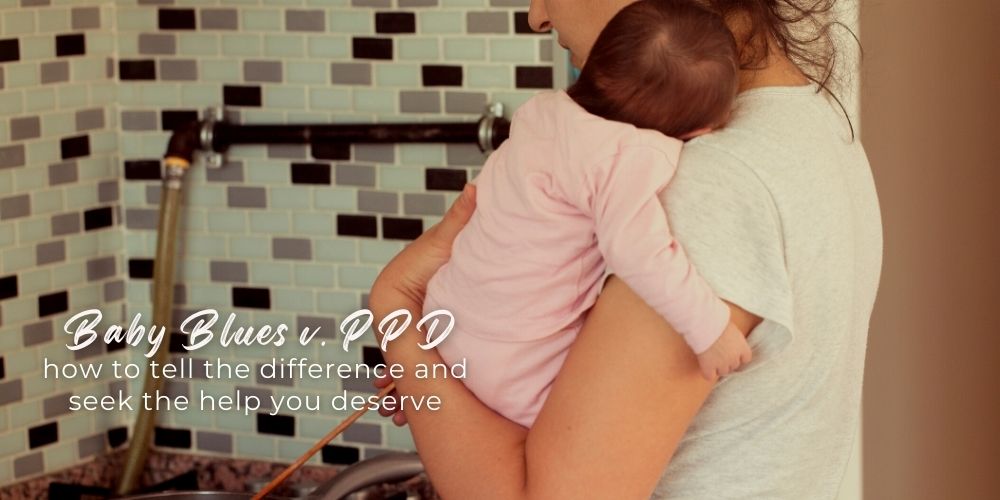Fluctuating hormones, lack of sleep, new responsibilities, a complete change in life and daily schedule – if those aren’t reasons to justify mood swings, I don’t know what are!
Putting the joy of a new baby aside, mood swings are common and expected during the 4th trimester. In honor of Mental Health Awareness Month, we wanted to touch on this very important topic that affects many, many moms.
So how can you tell if what you are experiencing is the common “Baby Blues” or if it is Postpartum Depression (PPD)? What can you do about it, and when should you seek help?
Baby Blues
Research shows that 50-70% of new moms will experience baby blues in the first few days after birth. Hallmarks of baby blues may include:
- Crying, sometimes for no apparent reason
- Irritability
- Anxiety
- Impatience
- Feeling overwhelmed
- Anger
- Exhaustion that interferes with your ability to care for yourself
- Insomnia
- Restlessness
- Appetite disturbances
These feelings/symptoms typically last for about two weeks.
Postpartum Depression (PPD)
PPD affects 10-15% of new moms and can appear after birth or gradually within the first year. Sometimes described as a worsening of the baby blues, moms with PPD may experience any of the baby blue symptoms listed above, along with varying degrees of the following:
- Rage
- Negative moods (dysphoria)
- Rapid changes in mood
- Panic attacks
- Inability to be reassured
- Indecisiveness
- Lack of interest OR over concern for baby
- Feelings of guilt/inadequacy/doubt/hopelessness
- Fear of harming self or baby
- Suicidal ideation
- Physical signs of restlessness like pacing
- Headaches/Stomach Aches
Unlike Baby Blues, PPD can begin anytime right after birth, to 12 months post-delivery, and there is no set time it lasts. In some cases, the symptoms will resolve 3-6 months after they begin, but it is important to note that this will differ from person to person and the most important thing to do is to speak to your doctor about a treatment plan.
What can you do?
If you are experiencing baby blues, try the following:
- Ask for help from your partner, friend, or family member. This help can be household chores or caring for the baby so that you can nap, eat a meal, take a shower, meditate, or another form of self-care you are craving.
- Don’t compare your situation to others. Pay attention to pressure or negative emotions you may feel when browsing social media, talking to others, etc. Protect your peace and allow yourself time to heal without pressure to post, update, or achieve things on a daily basis other than adjusting to your new routine, bonding with your baby, and allowing yourself time to heal.
- Self-care may feel selfish but it should be a priority. The time you are able to give to self-care may change, and what it looks like may change, but keep in mind the things that brought you peace prior to the baby, and find a way to incorporate a new version of it into your life. Did you use to exercise daily? Take a walk with your baby. Did you use to meditate? Latch on, hook up your pump, and mediate once situated. Bonus – this can help with your letdown! Do you feel better with a Mani/Pedi? Phone a friend or family member and pencil in an hour to go soak those feet.
If your baby blues do not subside after a few weeks and/or you are experiencing symptoms of PPD, connect with your doctor right away. There is no need to wait for a 6-week check-up to get the help you need.
If it is confirmed that you are experiencing PPD, your doctor will offer solutions whether it is medication safe to take if breastfeeding, therapy, or an alternative treatment plan that is suitable to you.
It is so important to know that there is NO shame in PPD and getting the help you need. Often, these feelings are out of your control and the proper intervention will allow you the mental and emotional well-being you deserve to enjoy this new chapter in your life.
Sending all the positive vibes to all the new moms out there. If you have your own experience with baby blues or PPD, along with tips to help, please comment below!




